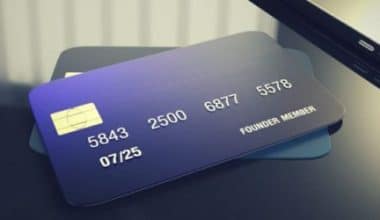A good business credit score can help you receive better terms on business loans, cut your business insurance costs, and negotiate better terms with suppliers.
However, businesses do not begin with a solid credit score; you must build business credit from the bottom up — or rehabilitate it if your company previously battled with cash flow and overdue payments.
Here’s a step-by-step guide to building business credit. But first, let’s how business credit works.
How Business Credit Works
Business credit functions similarly to personal credit. Payment history may be reported to commercial credit reporting agencies by lenders, vendors, and other businesses.
Other firms and lenders will then acquire a company’s credit report to help them determine whether to issue a credit or do business with it.
In contrast to personal credit, where the majority of loans are reported to credit bureaus, not all businesses disclose payment history to business credit.
In contrast to personal credit reports, which are more strictly monitored, anyone can obtain a business credit report.
Credit limitations and the identities of creditors are not routinely publicized. It might be tough to determine which companies show on business credit reports at times.
Who Needs a Business Credit?
Establishing and building solid business credit can help any eligible business. However, business credit is often used when you need to borrow money or pay customers and suppliers on terms (such as 30 or 45 days after receiving an invoice).
Reasons to Obtain and Keep Strong Business Credit
- Obtaining funds
- Keep ownership secure.
- Protect your personal credit.
- Create credit for the future.
There are various reasons why you might want to obtain business credit.
- Funding availability
A simple approach to get capital to invest in your business is through business credit. - Maintain ownership
Unlike seeking investors, obtaining financing through business credit has no impact on the ownership of your company. - Guard your personal credit.
Your personal credit score will not be impacted if your business is unable to repay its loans on time or has bad credit. - Establish future credit.
Even if you don’t need money right now, if you think you might in the future, opening a business credit account can provide you with greater borrowing options in the long run.
Is Business Credit Equivalent to Personal Credit?
While they appear to function similarly, business and personal credit are not the same. They do, however, serve a similar purpose: they assist lenders and suppliers in determining your likelihood of repaying a loan or other financial commitment taken out on behalf of your business. Though some business credit ratings include into account your personal credit, your personal and business credit profiles are distinct.
What is the Purpose of Business Credit?
A number of decisions, including the following, can be impacted by your business’s credit:
- Your loan eligibility or interest rates, including Small Business Administration (SBA) loans
- Insurance premiums for the business
- Net terms and credit limits offered by vendors and suppliers
- Your capacity to raise capital from investors
- Whether or not you are eligible for contracts with other groups
Is Your Personal Credit Important To Your Business?
If you own a small business, you must have both personal and business credit. For small business loans, it is typical practice for lenders to conduct personal credit checks. We’ll focus on how to build business credit here, but make sure your personal credit scores are also strong.
The good news is that even if your personal credit isn’t stellar, you can start building business credit.
Steps For Building Business Credit
#1. Incorporate your business.
Even if you’re incorporated as you read this, it’s worth mentioning. The business and the owner are legally the same in sole proprietorships and general partnerships. As a result, there can be no separation of business and personal credit histories. Incorporating a business or creating an LLC creates a legal entity distinct from the owner(s).
#2. Get an EIN
An EIN (federal tax identification number) is essentially a business’s social security number. It is necessary on federal tax returns and when opening a business bank account in the name of the corporation or LLC. Many larger firms demand an EIN from their vendors in order to pay them for services rendered in order to comply with IRS standards.
#3. Establish a business bank account
Open a business checking account in the name of the legal business. Once opened, make sure to pay any business financial activities from that account. If you frequently use a business credit card (see below), make sure to pay the credit card bill from your business checking account.
#4. Get a business phone number.
Have a distinct number for your business, under your legal name, whether you utilize a landline, cell phone, or VoIP. Make a note of that number in the directory so that it can be discovered.
#5. Establish a business credit file
Create a business credit file with each of the three credit reporting agencies: Experian, Equifax, and TransUnion.
#6. Obtain a business credit card (or cards).
Obtain at least one business credit card that is not personally associated with you or any other owners. Choose a business credit card issued by a corporation that reports to credit reporting bureaus.
#7. Establish a credit line with merchants or suppliers.
Collaborate with several vendors/suppliers (at least five, for example) to establish credit for your organization to use when purchasing from them. Request that your payment history be reported to credit reporting agencies.
#8. Always pay your bills on time.
Perhaps it should go without saying, but pay your payments on time. Late payments, like late payments on the personal credit, will have a negative influence on your business credit.
How to Maintain Your Business Credit
One of the most crucial aspects of building a good credit score is maintaining it once you’ve reached your desired level. Paying bills on time or early and developing strong connections with credit card issuers are two of the simplest strategies to keep your business credit score in good standing.
However, it is crucial to remember that creating strong financial habits, such as saving money, paying bills and taxes on time, making informed financial decisions about the future of your business, and developing excellent connections with suppliers and other businesses, is a key component of building good credit. While these factors may not directly affect your credit score, they do contribute to the overall financial experience that your business must provide.
Monitoring your business credit score to verify accuracy is another critical component of keeping it. Businesses must occasionally challenge inaccuracies and other concerns on their credit report that may not adequately reflect what occurred with a specific financial transaction.
Monitoring your business credit score isn’t tough, but you should know how to do it correctly.
What Effect Does Business Structure Have on Credit?
There are various types of business structures available to businesses, and each has varied credit requirements.
#1. The sole proprietorship
Sole proprietorships are enterprises that are owned by a single person who is completely responsible for the company’s debts. Creditors are permitted to claim the business owner’s personal assets in the event that the company goes bankrupt.
#2. Limited partnership
Limited partnerships have several owners, but only the general partners are personally accountable for business debts. The other partners are referred to as limited partners. They have less say in how the business is operated, but they are not personally accountable for its obligations.
#3. Limited liability partnership
In an LLP, all business owners are considered partners and have some liability protection in the event of negligence or misconduct on the part of other business partners. However, whether or not the owners are totally immune from personal culpability in the event of their own negligence differs by state.
#4. Limited liability company
An LLC is a business structure that protects the personal assets of the business owner from any claims brought against the business. To exist, LLCs must pay specific fees to both the federal and state governments, making them more expensive to maintain.
#5. Corporation
Shareholders in a corporate business structure are not accountable for the company’s debts beyond the amount invested. In contrast to LLCs, creditors can occasionally claim the company’s assets in the case of a default, cancel shareholders’ voting rights, and alter the company’s leadership.
How Long Will It Take For Your Business To Build Credit?
The time it takes to develop credit is determined by a variety of factors, including the form of your business, the personal credit of you and any partners, and the cash flow of the business. It typically takes one to three years for new enterprises to build enough credit to be eligible for small business loans. If you continue to repay your loans on time, your small business credit will improve.
Types of Business Credit
- Vendor credit
- Supplier credit
- Service credit
- Retail credit
- Business credit card
#1. Vendor Credit
To achieve their objectives, most firms must purchase equipment, resources, or inventory from a vendor. A restaurant owner, for example, will need to purchase ingredients to create meals.
Large vendors may occasionally allow business owners to open a “net 30 account.” A net 30 account allows a business to purchase supplies on credit with repayment due in 30 days. Many small firms use these commercial transactions to build credit.
#2. Supplier Credit
Supplier credit, like vendor credit, involves credit from suppliers to business owners purchasing inventory or resources for their businesses. On the other hand, supplier credit usually refers to longer-term and more intricate agreements than vendor credit. In international imports and exports, supplier credit arrangements are frequently employed.
#3. Services Credit
This is credit given to the business owner for services rendered. Utilities such as electricity, gas, water, and the Internet are examples. Typically, both businesses and individuals pay utility bills at the end of the month after services have been rendered. Paying your service bills on time will help you build your credit score and improve your payment history.
#4. Retail Credit
These are borrowing options that are widely available to the general public. Bank loans, mortgage loans, and credit card loans are a few examples. The higher your credit score, the more loans you will be able to obtain.
#5. Business Credit Cards
Credit cards are one of the most common ways of building business credit since they allow you to pay for all of your business costs with a single card and pay the amount at the end of each month. Many business credit cards are offered to businesses with little or no credit history, making them a viable alternative for new business owners. However, there are credit limits for new businesses as well as high-interest charges if the card debt is not paid off within the current billing cycle, which is normally 30 days.
Where Can You Find Your Business’s Credit Score?
Some third-party services notify businesses when their credit scores change at the major credit bureaus. This can be a fantastic way to keep track of your credit score throughout the year. Another method is to independently check with the individual business credit reporting organizations. It is not difficult, but you may be required to register directly with the agencies, which include Experian, Dun & Bradstreet, and Equifax.
Consider These Alternatives if You Lack Business Credit.
One reason to start early is that it can take time to build your business’s credit. However, having good personal credit is also vital. Lenders may verify an owner’s credit before granting a business loan or line of credit, especially for small enterprises.
If you have good personal credit, you may be able to obtain business loans or lines of credit with favorable interest rates and terms. Personal loans and credit cards are also options, but unless you run a sole proprietorship, it’s preferable to keep your business and personal funds separate. (Even so, segregating finances can make tax filing easier.)
When you need finance but are working on your business and personal credit, merchant cash advances may be an alternative. However, examine the terms carefully and proceed with prudence – financing that does not require strong credit is typically costly.
Conclusion
A business credit score is necessary for maintaining a financially viable and healthy business. It demonstrates to lenders and other businesses that your organization is financially sound and capable of paying key payments. It will not only assist you in obtaining loans, but it will also present you with alternatives to avoid prepayment. A good credit score might help you drive down prices or acquire more favorable interest rates and terms on financing packages from banks and online lenders as a bargaining weapon.
Once your business is legally founded, the best way of building credit is to pay your obligations on time – and as early as possible. You can improve your credit rating by acquiring credit cards and keeping your credit utilization below 30%. Maintain building your company’s financial image, and check in with the major credit bureaus on a regular basis to ensure your business credit score is accurate.
Related Articles
- HOW TO GET A BUSINESS LOAN WITH BAD CREDIT: All You Should Know
- HOW DO PERSONAL LOANS WORK? Step-By-Step Guide
- REQUIREMENTS TO BUY A HOUSE: A Step-By-Step Guide
- $2000 LOANS: What to Know About Getting a $2000 Loan With No Credit Check
- WHAT IS BUSINESS CREDIT: Definition, and Uses






